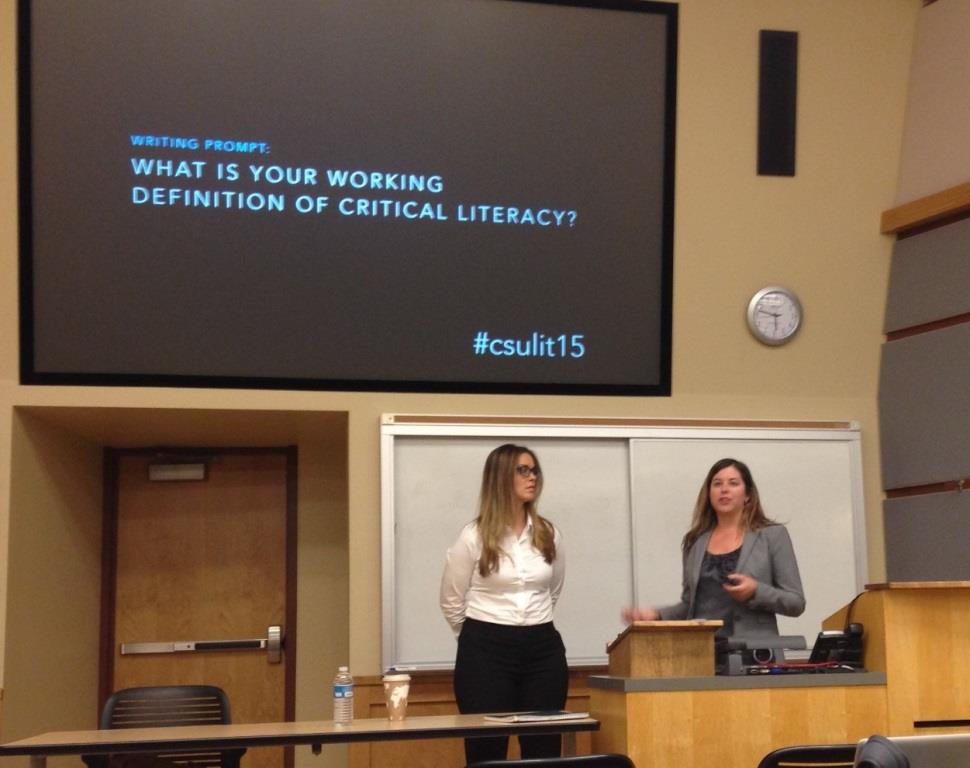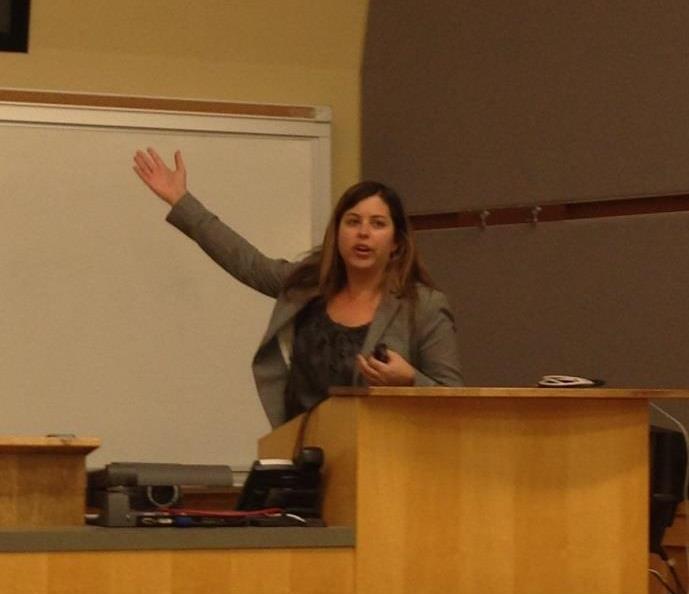English Department Communications Intern Marina Miller recently attended the first session of the CSU Writing Project Speaker Series on the Literacies of Contemporary Civic Life and has this to share:
Attending the first of several events in the CSU Writing Project Speaker Series on the Literacies of Contemporary Civic Life was my first assignment as a blogger for the English department. I had some idea that the audience would be mainly English Education majors or students who are already teaching, and while this event is not something I would have attended under other circumstances, I was pleasantly surprised at how welcoming the group was.
The speakers on the night of January 27th were Danielle Filipiak and Nicole Mirra, who have both taught in urban areas like Detroit and Los Angeles. Their presentation was titled: “Creating Spaces Where Choices Can Be Made: Critical Literacy in 21st Century Classrooms.” The opening slide was a writing prompt that all audience members were asked to respond to, either using the phrase #CSULitCrit15 on Twitter, or a good old fashioned pen and paper. The question was “What is your working definition of critical literacies?”

After reading this I had a tiny moment of panic; I felt like I was just handed a pop quiz but I was the only one who was unprepared. I sat there blankly for a minute thinking seriously about writing “I have no idea,” and then decided that I should at least give it a shot. I thought back to my Literacy and Gender class and various other courses that seemed to help prepare me for this specific moment and came up with this answer: “Critical literacy means the ability to analyze the world around you and relate that back to your own story and create your own meaning and space within different literacies.”

I was feeling pretty confident with my answer until we were told to find a partner and share our definitions. I kept thinking “Man, I’m in a room with all teachers, they are going to give me a terrible grade on this writing prompt.” However, the girl I spoke to, who is student teaching this semester, seemed to agree with my answer and even mentioned that if she was given more time, her answer would have looked similar to mine.
Once we finished our conversation and the audience members re-grouped, Filipiak and Mirra asked if anyone was willing to share. (Again my shy freshman self came out and I avoided all eye contact and waited for someone else to raise their hand). A young man behind me raised his hand and said that in his group one of the answers to the prompt was “I have no idea,” I could feel the grin spread across my face. Suddenly I was not the only one who was unsure of themselves and their answer. I decided that maybe this presentation would not be so far out of my comfort zone after all.
One of my favorite quotes from the presentation came from Danielle Filipiak when she was explaining her purpose teaching critical literacy, to students who feel as though they don’t always have a voice in their world. She said, “I want my students to know the power in words. I want them to know that words can manipulate and I want to make sure that they are not manipulated themselves.”
When Nicole Mirra explained her focus when teaching critical literacy, she was very honest with the group. She spoke about how when she first became a teacher she wanted to pass on her love of books to her students and she hoped that books could help them figure out who they were, like they did for her. When she became a teacher, her outlook changed as soon as she met her students. She quickly determined that she wanted her students to use critical literacy skills to advocate for themselves and use their voice to take social action.

The whole night was filled with powerful quotes like these and pictures of student work that showed a glimpse into what these students were feeling every day and how that reflected in their daily school lives. The speakers both talked about how they had to learn not only to get the students to listen to each other, but to listen to their students and learn from them as well. The overall presentation made me think back to all the teachers I had in public schools in my life and to wonder which ones I failed to appreciate. While teaching is not a profession I have seriously considered entering, if I did I would try to think back to this presentation and apply it to my classroom.
Assistant Professor Antero Garcia also wrote about this session, in his post on dmlcentral, Defining a Participatory Critical Literacy. The session was also recorded, so even if you had to miss it, you can watch it here.
More about this series: Throughout the spring semester we’ll be hosting nationally recognized literacies-based researchers and educators to discuss how literacy and youth civic participation intersect from varying, interdisciplinary perspectives. The speakers will be presenting their work and engaging in dialogue from 5:30-6:30, followed by a brief reception. These events are free and open to the public. All of the speakers will be presenting at the CSU campus in Clark A 205.
Up next: February 17th, Dr. Ben Kirshner, Faculty Director, CU Engage: Center for Community-Based Learning and Research, “Literacies of Youth Activism: from Colorado to Cape Town.”
